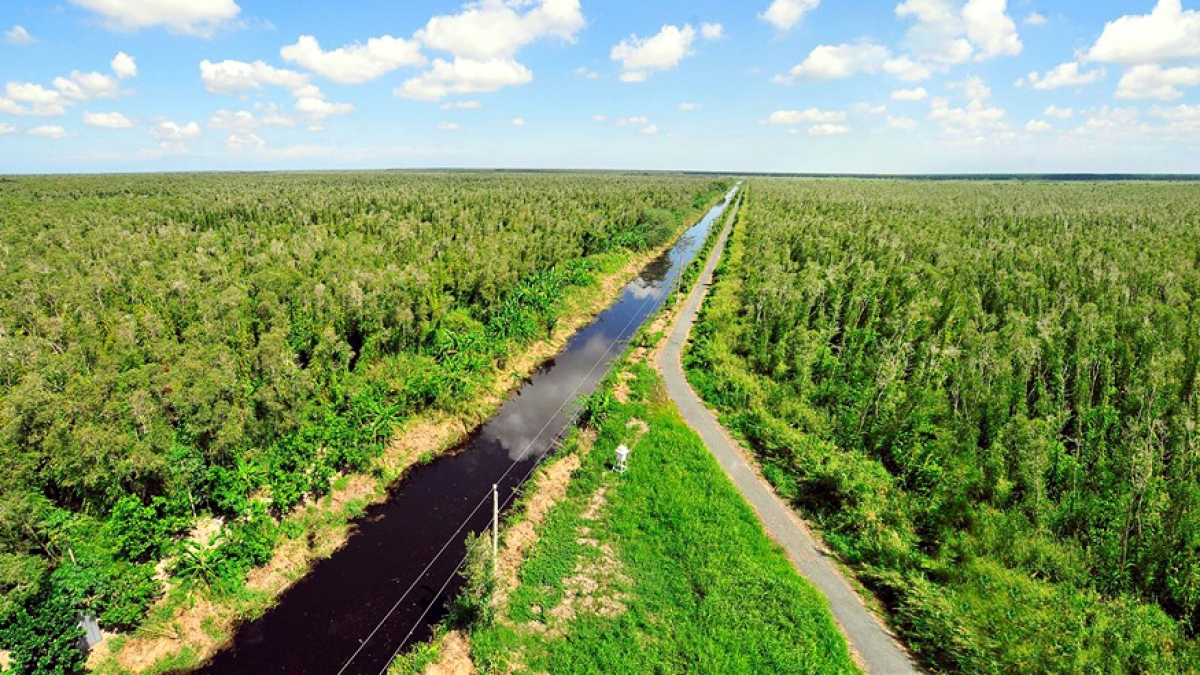Establishing the Carbon Credit Exchange
The establishment of the Carbon Credit Exchange in Vietnam is a significant milestone in the nation's journey to address climate change and environmental conservation. Minister of Finance Hồ Đức Phớc affirmed that the transition to green practices and emissions reduction represents a long-term challenge, demanding substantial efforts, with resource allocation emerging as one of the most prominent challenges.

Challenges in the Journey of Green Transformation and Emissions Reduction
According to the World Bank's estimates, in order to achieve the goal of sustainable development combined with resilience and net-zero emissions by 2040, Vietnam will need to invest approximately $368 billion USD, equivalent to 6.8% of GDP annually. A significant part of this goal is carbon reduction, and estimates indicate that about 30% of the resources will need to be mobilized to meet international commitments. However, the public sector can only contribute about one-third of the required resources, while the green finance market is still in its early stages and the resources mobilized through it are relatively small compared to the demand.
Focused Efforts by the Ministry of Finance
The Ministry of Finance has concentrated on reforming the tax system, managing public debt, and restructuring the state budget. The goal is to allocate resources sensibly for the state budget, create favorable conditions for mobilizing, allocating, and efficiently utilizing financial resources. This ensures a balance between economic, social, and environmental development, while also ensuring national security and social welfare.
Environmental Pollution Restriction Policy Group
In this policy group, measures to restrict environmentally harmful activities have been established, including:
-
Environmental Protection Tax: This tax plays a crucial role as a taxation measure, applied to products and goods with the potential to harm the environment. It is an effective way to limit the development of products or activities that are detrimental to the environment while providing necessary financial resources for environmental protection and improvement.
-
Resource Tax: This tax applies to the use of natural resources such as water, minerals, and energy. It encourages sustainable resource use and enhances efficient resource management.
-
Special Consumption Tax: Products or services with a significant impact on the environment may be subject to higher taxes. This encourages consumers to choose environmentally friendly products or services and reduce consumption of environmentally harmful ones.
Environmental Protection Support Policy Group
This policy group supports and encourages environmental protection activities and pollution reduction. Measures in this group include:
-
Corporate Income Tax Incentives: Businesses undertaking new investment projects in the environmental protection sector can enjoy a corporate income tax rate of 10% for 15 years. This incentivizes investment in green projects and emission reduction.
-
Value Added Tax (VAT): VAT policies have been adjusted to encourage the use of environmentally friendly products and services. For example, the transfer of emissions rights (carbon credits) is not subject to VAT. Goods and services contributing to the green economy are also exempt from VAT.
-
Special Consumption Tax: Products such as biofuels and environmentally friendly cars receive preferential tax rates. This encourages the use of products and services that contribute to environmental protection.
International Cooperation to Address Resource Shortages
To address the resource shortages for green growth and climate change adaptation, Vietnam needs to enhance cooperation and receive support from the international community. The Ministry of Finance has committed to collaborate with relevant ministries and agencies to explore solutions for mobilizing private resources and international organizations. Key priorities include the development of the green finance market and the carbon market, focusing on developing green and sustainable financial instruments and attracting investments into green financial products.
The Green Finance Market
Notably, in recent years, Vietnam has successfully mobilized resources from the private sector and international organizations by creating and developing a robust green finance market. As of now, Vietnam's green finance market has established a strong foundation and experienced significant growth, comprising three main segments: green credit, green equity, and green bonds.
The Ministry of Finance has worked closely with relevant authorities to refine the legal framework related to green bonds. To promote the development of the green bond market, the Ministry of Finance has issued guidelines for issuers and investors in green bonds, including a 50% reduction in service fees in the securities market for green bonds.

By 2028, Vietnam will officially operate a carbon credit exchange platform.
Deploying the Domestic Carbon Market
The Ministry of Finance has made it clear that the roadmap for deploying the domestic carbon market was issued by the Government in Decree No. 06/2022/NĐ-CP on January 7, 2022, regarding greenhouse gas emissions reduction and ozone layer protection regulations. From now until 2027, the focus will be on establishing regulations and policies to create a foundation for the market to operate. This includes the establishment and organization of a pilot carbon credit exchange platform, with the aim of officially operating it by 2028.
The production and trading of carbon credits in Vietnam are flourishing, thanks to the government's commitment and international cooperation. This marks a significant step forward in promoting sustainability and environmental protection in the country.
Prospects for the Carbon Credit Exchange Platform in Vietnam
The Carbon Credit Exchange Platform in Vietnam is facing promising prospects in contributing to the Net Zero goal and environmental protection. With the government's commitment and international collaboration, this exchange platform will play a crucial role in advancing the sustainable development of the country.
Businesses' Necessary Actions
Engage in the Green Finance Market: Businesses can benefit from the green finance market by issuing green bonds or investing in green financial instruments. This not only enhances a company's image but also supports environmental protection projects.
Comply with Carbon Credit Regulations: Ensure full compliance with regulations and explore ways to participate in the carbon credit market. This can provide financial opportunities and contribute to emission reduction targets.
Contact Us - Giant Barb:
How We Support Businesses and the Environment:
Carbon Auditing: We provide accurate carbon auditing services for businesses, offering suggestions for emission reduction measures. This helps companies minimize their negative environmental impact and save resources.
Carbon Finance/Climate: We assist businesses in managing climate-related finances and developing green financial strategies, optimizing financial performance while ensuring environmental compliance.
Project Development: We collaborate with businesses in building and implementing green development projects, from project design to green finance mobilization, ensuring that all activities contribute to environmental protection.
Sustainable Consulting: With a network of leading partners in the field, we can create collaboration opportunities both domestically and internationally, helping businesses unlock vast potential in sustainability and integrating green solutions into their business strategies.